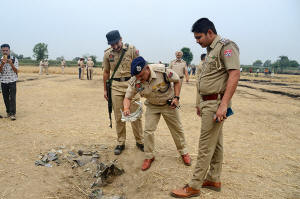Pakistan and India hint at de-escalation after trading missile strikes
[May 10, 2025]
By MUNIR AHMED, AIJAZ HUSSAIN, SHEIKH SAALIQ and RAJESH
ROY
ISLAMABAD (AP) — India and Pakistan on Saturday signaled they were ready
to de-escalate their conflict if the other reciprocates following
missile and drone attacks on each other’s military bases, in the most
serious confrontation between the nuclear-armed rivals in decades.
The two have been locked in hostilities after a gun massacre last month
that India blames on Pakistan.
Pakistan’s foreign minister said his country would consider
de-escalation if India stopped further attacks. However, Ishaq Dar
warned that if India launched any strikes, “our response will follow.”
Dar told Pakistan’s Geo News that he also conveyed this message to U.S.
Secretary of State Marco Rubio, who contacted him after Rubio spoke to
New Delhi earlier.
“We responded because our patience had reached its limit. If they stop
here, we will also consider stopping,” Dar added.
India said it targeted Pakistani air bases after Islamabad fired several
high-speed missiles at military and civilian infrastructure in the
country’s Punjab state early Saturday.
Pakistan earlier said it intercepted most missiles and that retaliatory
strikes on India were underway.
Rubio spoke to his Indian counterpart Subrahmanyam Jaishankar and
emphasized that “both sides need to identify methods to de-escalate and
reestablish direct communication to avoid miscalculation,” State
Department spokesperson Tammy Bruce said Saturday, and offered U.S.
support to facilitate “productive discussion.”

India says it’s committed to ‘non-escalation’
Indian Col. Sofiya Qureshi, at a news conference in New Delhi, said
Pakistan targeted health facilities and schools at its three air bases
in Indian-controlled Kashmir. “Befitting reply has been given to
Pakistani actions,” she said.
Wing Commander Vyomika Singh, also present at the news conference, said
India was committed to “non-escalation" provided that Pakistan
reciprocated. However, Pakistani ground forces were observed mobilizing
toward forward areas, she said, “indicating an offensive intent to
further escalate the situation.”
“Indian armed forces remain in a high state of operational readiness,”
she added.
Singh said Indian armed forces carried out “precision strikes only at
identified military targets in response to Pakistani actions," which
included technical infrastructure, command and control centers, radar
sites and weapon storage areas to ensure “minimum collateral damage."
"All hostile actions have been effectively countered and responded to
appropriately,” said Singh.
The Pakistani military said it used medium-range Fateh missiles to
target an Indian missile storage facility and air bases in the cities of
Pathankot and Udhampur.
The Associated Press could not independently verify all the actions
attributed to Pakistan or India.
Army spokesman Lt. Gen. Ahmad Sharif said Pakistan's air force assets
were safe following the Indian strikes.
Indian strikes target Pakistani air base in Rawalpindi
State-run Pakistan Television reported that Prime Minister Shehbaz
Sharif convened a meeting of the National Command Authority, which
oversees the country’s missile program and other strategic assets.
[to top of second column]
|

Indian police personnel inspect an object suspected to be parts of a
projectile intercepted by the Indian Army at Nahlan village on the
outskirts of Jalandhar, India, Saturday, May 10, 2025. (AP Photo)

Tensions between the nuclear-armed rivals have soared since an
attack at a popular tourist site in India-controlled Kashmir left 26
civilians dead, mostly Hindu Indian tourists, on April 22. New Delhi
has blamed Pakistan for backing the assault, an accusation Islamabad
rejects.
Indian missiles Saturday targeted Nur Khan air base in the garrison
city of Rawalpindi, near the capital Islamabad, Murid air base in
Chakwal city and Rafiqui air base in the Jhang district of eastern
Punjab province, according to Pakistan's military spokesman.
There were no immediate reports of the strike or it aftermath from
residents in the densely populated Rawalpindi.
Explosions in India-controlled Kashmir
Following the announcement of Pakistani retaliation, residents in
Indian-controlled Kashmir said they heard loud explosions at
multiple places in the region, including the two big cities of
Srinagar and Jammu, and the garrison town of Udhampur.
“Explosions that we are hearing today are different from the ones we
heard the last two nights during drone attacks,” said Shesh Paul
Vaid, the region’s former top police official and Jammu resident.
“It looks like a war here.”
Vaid said explosions were heard from areas with military bases,
adding it appeared that army sites were being targeted.
Srinagar appeared calm early Saturday, but some residents in
neighborhoods close to the city’s airport, which is also an air
base, said they were rattled by the explosions and booming sound of
fighter jets.
“I was already awake, but the explosions jolted my kids out of their
sleep. They started crying,” said Srinagar resident Mohammed Yasin,
adding he heard at least two explosions.
Praveen Donthi, a senior analyst with the International Crisis Group
for India, said the two countries were at war even if they had not
yet labelled it as one.
“It’s become a remorseless race for military one-upmanship with no
apparent strategic end goals from either side,” said Donthi. “With
increasing civilian casualties on both sides, finding an exit or
off-ramp is going to be challenging.”
India and Pakistan have traded strikes and heavy cross-border fire
for days, resulting in civilian casualties on both sides.
____
Hussain reported from Srinagar, India. Saaliq and Roy reported from
New Delhi. Associated Press writers Babar Dogar in Lahore, Pakistan,
Asim Tanveer in Multan, Pakistan, and Riaz Khan in Peshawar,
Pakistan, contributed to this report.
All contents © copyright 2025 Associated Press. All rights reserved
 |